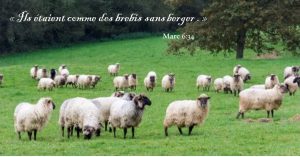L’être humain est doué de qualités et de capacités multiples.
Ayant prononcé ces mots, on pense immédiatement à l’intelligence et à la liberté qui le caractérisent.
Mais une autre faculté fait aussi partie de ses dons, c’est l’imagination!
Quels prodiges elle opère cette aptitude qui nous fait littéralement voir – en esprit – tant de réalités.
Un lion ou un chat, un vélo ou un train, les arbres ou les étoiles, un enfant ou un vieillard: chaque fois l’image évoquée surgit à l’esprit!
Mais si le mot prononcé est… DIEU… quelle image vous apparaît soudainement?….
Pour plusieurs personnes, il semble qu’il y ait un délai… l’image ne se présentement pas subitement comme cela se produit quand d’autres termes sont prononcés.
L’évocation reste parfois… dans le domaine de l’abstrait…
C’est que justement DIEU défit l’imagination!
Et pourtant… il est bien RÉEL!…
La meilleure manière de le percevoir – sans le voir – c’est de retrouver les ‘images’ de lui que nous offre la Bible.
Les lectures de ce dimanche nous donnent l’une de ces images qui nous aident à le reconnaître: c’est celle du berger –
le pasteur qui a compassion de son troupeau.
Le texte de l’évangile commence avec une scène bien humaine (Marc 6:30-34).
Jésus réalise que ses apôtres sont las et ont besoin de repos, il suggère que le groupe se retire à l’écart pour un peu de répit.
Mais voilà que les gens qui désirent entendre son enseignement devinent l’endroit où Jésus et les apôtres se dirigent et les rejoignent sans délai.
 Le texte continue avec une phrase qui caractérise Jésus:
Le texte continue avec une phrase qui caractérise Jésus:
« Il fut saisi de compassion envers eux,
parce qu’ils étaient comme des brebis sans berger ».
DIEU incarné en Jésus est un Dieu de COMPASSION.
Notre imagination fait erreur si elle nous présente une autre image de lui quelle qu’elle soit!
Il nous connaît, comme le pasteur reconnaît chacune de ses brebis.
Il comprend les difficultés auxquelles nous faisons face.
Il est conscient des situations compliquées que nous nous créons parfois…
Il sait que notre faiblesse nous empêche souvent de faire ce qu’il attend de nous.
Comme les brebis dont parle le prophète Jérémie dans la 1ère lecture (Jérémie 23:1-6),
« apeurées, effrayées, perdues »,
nous connaissons souvent la crainte, l’anxiété, et il nous semble avoir perdu le chemin.
Le Dieu de compassion vient à notre secours et nous donne salut et sécurité.
Il réprimande même avec force ceux qui auraient dû être de bons bergers pour son peuple
mais ont « dispersé et chassé les brebis ».
Le Psaume 23, que notre célébration utilise comme répons à la 1ère lecture, est une description juste et tellement inspirante du Pasteur compatissant toujours à notre recherche…
Note: Une autre réflexion, sur un thème différent, est disponible en anglais à:
 « Demeurez en moi, comme moi en vous…
« Demeurez en moi, comme moi en vous… Y for Yeast
Y for Yeast Étonnamment, c’est ce que Jésus fait dans la scène de l’évangile de ce dimanche.
Étonnamment, c’est ce que Jésus fait dans la scène de l’évangile de ce dimanche. Si on demandait à chaque chrétien/ne ce qu’il, ou elle, trouve le plus difficile pour être fidèle au message du Christ,
Si on demandait à chaque chrétien/ne ce qu’il, ou elle, trouve le plus difficile pour être fidèle au message du Christ,  L’expression nous est familière: ‘Les DISCIPLES de Jésus’.
L’expression nous est familière: ‘Les DISCIPLES de Jésus’. We imagine them listening to Jesus and following him on the roads where he walks.
We imagine them listening to Jesus and following him on the roads where he walks.

 And it is to a shepherd that Jesus has identified himself as he said:
And it is to a shepherd that Jesus has identified himself as he said: